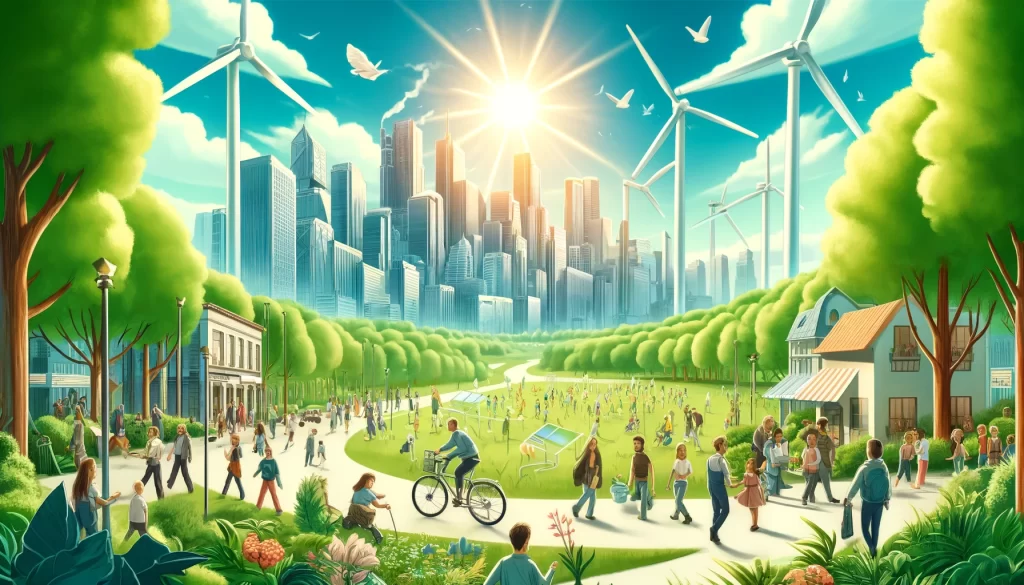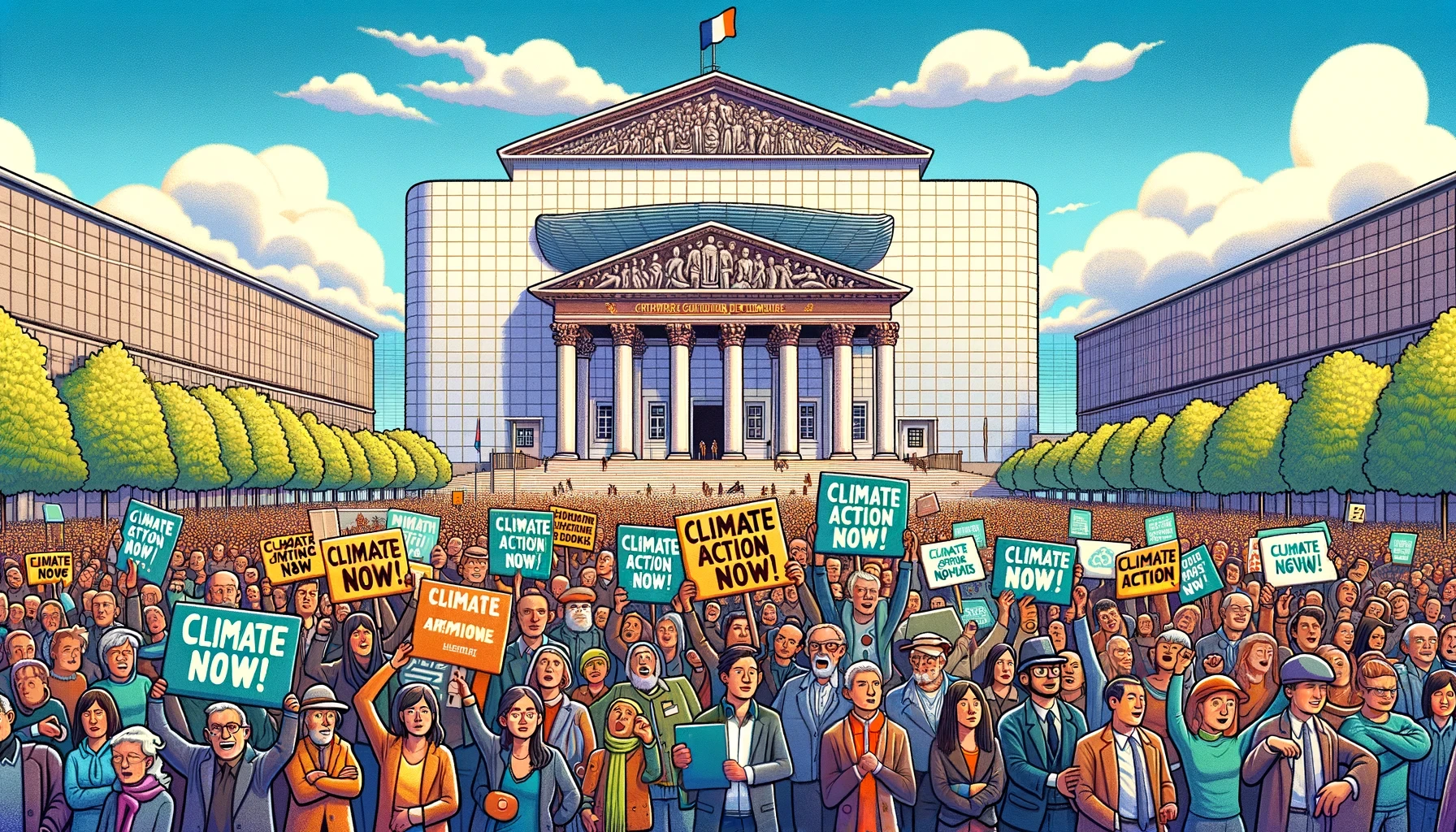In Strasbourg, France, a significant legal decision was made that could change the way governments approach climate change. The European Court of Human Rights, the top human rights court in the continent, made a historic ruling against the Swiss government for not doing enough to combat climate change. This verdict is not just a win for those directly involved but sets the stage for future climate-related legal battles across Europe and possibly the world.
The case was brought forward by over 2,000 Swiss women, who formed a group known as KlimaSeniorinnen. These women, all over the age of 64, argued that their government’s lack of action on climate change was putting their lives at risk, especially during heatwaves. Their argument was based on the idea that their age and gender made them more susceptible to the dangers posed by climate change.
The court’s president, Siofra O’Leary, highlighted in her ruling that the Swiss government had not met its own greenhouse gas emission reduction targets and had not established a national carbon budget. She stressed the importance of protecting future generations from the increasing burden of climate change, noting that the current failures and omissions to address the issue would have long-lasting effects.

Rosmarie Wydler-Wälti, one of the leaders of KlimaSeniorinnen, expressed her astonishment at the magnitude of their victory, reflecting the significance of the court’s decision. Meanwhile, the Swiss Federal Office of Justice acknowledged the ruling, stating that it would review the judgment and consider future actions.
This ruling is part of a growing trend of climate litigation, where individuals are taking legal action against governments, citing human rights law. These lawsuits aim to hold governments accountable for their role in contributing to climate change. The Swiss case, which is now a binding legal precedent for all 46 countries that have signed the European Convention on Human Rights, signifies that Switzerland, and potentially other governments, are legally obligated to take more robust action on reducing emissions.
The decision could also have broader implications, influencing future court decisions in Strasbourg and potentially leading to financial penalties for Switzerland if it does not update its policies. It’s worth noting that Switzerland has already committed to reducing its greenhouse gas emissions by 50% by 2030 from 1990 levels. However, proposed measures to achieve this goal were rejected by Swiss voters in 2021 as being too burdensome.

Other climate cases are pending in courts around the world, including in Australia, Brazil, Peru, South Korea, and India, where courts are considering human rights-based arguments against climate change. This global movement towards using the legal system to address climate issues highlights the role of the judiciary in enforcing government accountability on environmental matters.
The court’s decision in the Swiss case is a landmark moment for climate activism, showing that legal pathways can be effective in pushing governments towards more aggressive action on climate change. It serves as a blueprint for other groups looking to challenge their governments’ climate policies and underscores the interconnectedness of human rights and environmental sustainability.
This article is based on the following article:

Background Information
By understanding these concepts, readers can better grasp the significance of the ECtHR’s ruling against Switzerland and the broader implications of climate litigation as a tool for enforcing action on climate change.
1. Climate Change
Climate change refers to significant changes in global temperatures and weather patterns over time. While climate change can occur naturally, scientific evidence shows that human activities are currently driving an unprecedented rate of change. This includes the burning of fossil fuels (like coal, oil, and gas), deforestation, and industrial processes, which release large amounts of greenhouse gases into the Earth’s atmosphere, thereby trapping more heat from the sun and leading to global warming.
2. Greenhouse Gas Emissions and Their Reduction
Greenhouse gases (GHGs) like carbon dioxide (CO2), methane (CH4), and nitrous oxide (N2O) absorb infrared radiation, trapping heat in the Earth’s atmosphere and causing the planet to warm. Reducing these emissions is crucial in slowing down global warming and mitigating climate change. Countries around the world have committed to various targets to reduce their GHG emissions, often as part of international agreements like the Paris Agreement.
3. The Paris Agreement
The Paris Agreement is a landmark international accord adopted by nearly every nation in 2015 to address climate change and its negative impacts. Its goal is to limit global warming to well below 2, preferably to 1.5 degrees Celsius, compared to pre-industrial levels. To achieve this, countries must submit their plans for reducing emissions, known as nationally determined contributions (NDCs).
4. Human Rights and Climate Change
The impacts of climate change, such as extreme weather events, rising sea levels, and severe droughts, threaten the fundamental human rights to life, health, food, and an adequate standard of living. Vulnerable populations, including the elderly, children, and those in developing countries, are particularly at risk. Recognizing climate change as a human rights issue is crucial for mobilizing action to mitigate its effects and adapt to its impacts.
5. The European Court of Human Rights (ECtHR)
The ECtHR is a supranational court established by the European Convention on Human Rights. It hears cases on alleged violations of the civil and political rights set out in the Convention by member states. The Court’s rulings are binding on the countries involved, meaning they are obligated to comply with the judgment.
6. Climate Litigation
Climate litigation refers to lawsuits filed to force governments or corporations to take action on climate change, reduce greenhouse gas emissions, or compensate for damages caused by climate impacts. These cases can be based on various legal grounds, including constitutional rights, environmental laws, and human rights law.
The Swiss Case Context
In the specific case of the Swiss women (KlimaSeniorinnen), they argued that their government’s failure to adequately address climate change posed a risk to their lives and well-being, particularly in light of the increased frequency and severity of heatwaves. This case highlights how climate change is not only an environmental issue but also a matter of protecting citizens’ rights to life and health.

Debate/Essay Questions
- Is climate litigation an effective tool for combating climate change, or does it place undue burden on governments?
- Do individual countries have a responsibility to take action on climate change, even if other countries do not meet their own commitments?
Please subscribe to Insight Fortnight, our biweekly newsletter!
